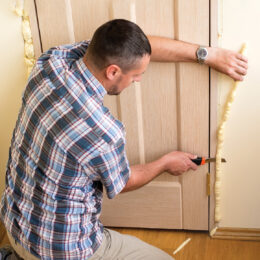Throughout the years at this job, I have heard many questions regarding breakers and fuses. I can’t possibly answer every question it this short article, but I can give you some basic answers. If you have any questions when working with electricity, always get professional help and never guess what is right. You may be betting your life on a guess.
What do breakers and fuses do?
They protect the electrical circuit from overload. If the flow of electricity (current) gets too high, they will stop it. A fuse will melt inside to open the circuit and will need to be replaced to close again. A breaker will trip to open a circuit (the same way a light switch can open a circuit) and just needs reset to close it again. These devices protect equipment only. To protect yourself, you’ll need a Ground-Fault Circuit Interrupter (GFCI).
What size do i need?
The fuse or breaker is sized to the amount of current (amps) the circuit can safely handle. It will be marked showing how many amps it will allow before it trips or opens the circuit. The wire will be rated, too. Never use a larger fuse or breaker than that rated amount. If we did change a fuse or breaker to a larger amperage than the wire rating, then that wire could get too hot and cause a fire. Never change fuses or breaker to higher amperage unless you know that the whole circuit is rated to handle the higher amps. This could be very dangerous.
 What kind do i need?
What kind do i need?
This is really a two-part question. First, you need to purchase a fuse or breaker that will work in your breaker or fuse box. The fuse must be the same style to fit in your box. This could be a cartridge fuse, blade fuse, Edison base or type S (last two are screw in). The breaker must be the same brand or style as your breaker box. This means if you have a Square D breaker box, you need to get a Square D breaker. Some breakers will interchange with other boxes, but it is always easier to get the same brand.
Second, you will need to know if you need a fast-blow or slow-blow fuse. Fast-blow fuses open the circuit right away if the circuit draws more amps than it is rated for. This type is good for anything with no start-up load (like lights). Slow-blow or time-delay fuses have built-in delays that allow for temporary and harmless inrush currents. This type is good for circuits with a temporary start-up load (like motors). Breakers are only required if you need 120 volts or 240 volts.
Why do i keep blowing fuses or tripping breakers?
This means there is a problem in the circuit. Sometimes, too many devices are being used or something connected to the circuit has a short or is not working correctly. This could overload the circuit and trip the fuse or breaker.
Start by turning off or unplugging devices until the breaker can be reset or fuses stop blowing. If you plug the same device into another circuit and it starts tripping, then that device may be the problem. It could be too large of load or have a short or wiring problem in itself. Sometimes, the fuse is being screwed into a bad socket. I have seen breakers that have gone bad and just don’t work anymore and must be replaced.
If you have a fuse or breaker tripping, the problem needs to be fixed. If you cannot find the problem, contact a qualified electrician. The problem must be fixed before a fire happens or someone gets electrocuted.
Greg Bitterling
Member Services Manager and
Energy Advisor at Fulton County REMC




